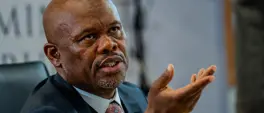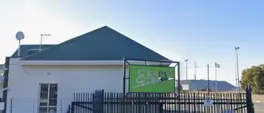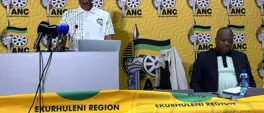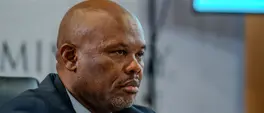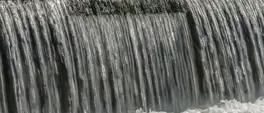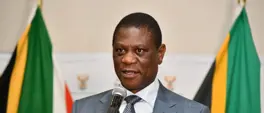MALAIKA MAHLATSI: The DA’s Eleanor Bouw-Spies is entitled to her own opinions, but not to her own facts
Malaika Mahlatsi
12 November 2025 | 9:45"Like many DA politicians before her, she is attempting to use our emotions to pass off uninformed, misguided and downright dishonest opinions as facts. But while Bouw-Spies is entitled to her own opinions, she is not entitled to her own facts."

FILE: Eskom's Megawatt Park in Johannesburg. Picture: Eyewitness News
Last Friday, Eleanore Bouw-Spies, the Democratic Alliance's spokesperson on Public Service and Administration, published an op-ed on this platform.
The article, titled Paying millions for failure: SA's SOE salary scandal, provided an analysis of the systematic failures of South Africa’s state-owned enterprises (SOEs), placing the remuneration of executives at the centre of the argument.
Like all South Africans, I am deeply troubled by the state of SOEs that are in constant need of bailouts from the government. It is unconscionable that South African taxpayers are consistently funding enterprises that have perennially failed to implement meaningful turnaround strategies while draining public funds and forcing cuts in other critical government spending areas including health and pensions.
As of March 2025, the cost of bailing out South SOEs is estimated at approximately R520.6 billion over the last decade, according to Finance Minister, Enoch Godongwana. This figure represents the combined cost of bailouts and debt takeovers for failing SOEs.
Extensive research has been done to investigate and analyse the root causes of the chronic failure of SOEs in South Africa. The results are not ambiguous – SOEs are failing due to a combination of financial mismanagement, corruption, lack of skills and political interference.
The outcome of these factors is evidenced in the poor corporate governance and perverted procurement processes that have come to define many of our SOEs. The impact on the economy is catastrophic. Not only is the government forced to cut funding to vital public services, impacting service delivery, but the state of SOEs has resulted in under-investment which further exacerbates their debt spiral.
Furthermore, as many SOEs operate with outdated business plans that are no longer relevant in today's competitive environment, this hinders their ability to compete with private companies.
Despite these documented failures, many executives in SOEs continue to earn salaries that are consummate with executives in profitable and high-performing private sector companies.
As Bouw-Spies correctly asserts in her article, the exact figure of salaries paid to SOE executives is not known as a significant portion of the enterprises have not disclosed their executive compensation figures.
Bouw-Spies questions the high remuneration of SOE executives that happens alongside underperformance. Her assertion that “this disconnect requires scrutiny when dealing with taxpayers' money” is undebatable. There is no reasonable ground for executives in underperforming SOEs to earn high base salaries, additional allowances, retirement contributions and bonuses totalling millions of Rands.
Research by SABRE Risk posits that rewarding incompetence carries significant costs for organisations, including financial losses, decreased productivity, high employee turnover, damaged company culture, and a decline in innovation.
The negative effects ripple through the entire organisation, impacting motivated employees, customers, and overall business performance. The state of SOEs is the evidence.
However, in her well-reasoned argument, Bouw-Spies enters a problematic terrain that is favoured by many politicians – the distortion of truth.
She makes an example of four SOEs that she claims are underperforming while their executives take home millions, namely: Transnet, the Passenger Rail Agency of South Africa (PRASA), the Road Accident Fund (RAF) and Rand Water. There is a basis for the inclusion of the first three SOEs.
While the Transnet CEO earns R8.5 million annually, the entity has experienced significant operational failures and has, over the years, received a R47 billion bailout from the state.
PRASA, whose CEO earns R7.8 million in remuneration, has received audit disclaimers while experiencing widespread service collapse. It has billions in stalled projects, and despite significant funding, the agency's infrastructure is in a state of disrepair, with only 10% of rail lines operational at one point, according to a 2024 report.
The RAF, whose CEO earns R7.1 million in remuneration, is technically insolvent, with a deficit that has ballooned from R1.6 billion in 2024 to R2.3 billion in 2025. But the inclusion of Rand Water to the list of underperforming SOEs is baffling.
Bouw-Spies makes the claim that Rand Water, whose CEO’s remuneration package is R5.4 million, is a dysfunctional SOE that is “facing water outages, service delivery and infrastructure failures, impacting South African households and businesses directly”. In claiming that water outages are the fault of the bulk water utility, Bouw-Spies is repeating a distortion that has often been made by DA politicians and some sections of the media. In the majority of its areas of operation, Rand Water supplies water to municipalities, who then have the responsibility of ensuring that it reaches households and businesses.
It is these municipalities with poor water governance, not Rand Water, that are the reason for our water challenges.
Just a year ago, the Minister of Water and Sanitation, Pemmy Majodina, appearing before the Portfolio Committee of Water and Sanitation in a meeting that was called in response to the deteriorating water situation in Gauteng, confirmed that water overuse and municipal non-revenue issues are the cause of the water crisis in the province.
She went further to state that Rand Water, contrary to Bouw-Spies’ and the DA’s long-held argument of its incompetence, is, in fact, extracting the right amount of water to supply the province adequately.
This has been corroborated by the Gauteng Provincial Government, with Premier Panyaza Lesufi and COGTA MEC, Jacob Mamabolo, both confirming at the inaugural Gauteng Local Government Turnaround Strategy Summit that deteriorating municipal water infrastructure is the cause of water outages. Mamabolo went further to condemn municipalities for having no plan to arrest the decline.
The argument about Rand Water having infrastructure failures is also false. In just the last five years, a few SOEs have invested in infrastructure at the scale and pace of Rand Water. Just a few months ago, it launched System 5A, executing its augmentation programme through the construction of the said water purification facility.
System 5A will add 600 million litres a day to Rand Water’s capacity, of which 150 million litres a day is already in use, with the full commissioning and handover expected by the end of December 2025.
This water will be purified at the bulk water purification plant, which can now purify up to 1.2 billion litres of water a day, providing water in Gauteng and surrounding provinces including Mpumalanga and the North West. In addition to this, just two years ago, Rand Water constructed the 210-megalitre Vlakfontein Reservoir in Germiston.
The project is a multi-million-rand investment designed to increase water storage capacity for the growing demand in its areas of operation. It won the 2022 Fulton Award for Engineering Excellence as the largest post-tensioned circular concrete reservoir in the world.
Bouw-Spies makes reference to the CEO’s remuneration as contained in its 2024 Integrated Annual Report. But what she conveniently leaves out is that the same report details the functional state of the bulk water utility and highlights its exceptional performance.
Just last year, Rand Water achieved growth of 11.42% in revenue to R21.82 billion and issued unsecured bonds to the amount of R3.2 billion as at the 30th of June 2024 under the registered R10 billion Domestic Medium Term Note Programme (DMTN).
This entity that Bouw-Spies claims is dysfunctional achieved an unqualified audit outcome for the 2023/2024 financial year, with Fitch Ratings reaffirming its ‘AA+’ positive outlook rating.
Furthermore, Rand Water is one of few SOEs with very strong Ethical, Fraud and Anti-corruption policies and procedures, evidenced in the fact that in the year under review of the Annual Report that she refers to, no incidents of corruption were reported or confirmed.
One can go further and engage previous years’ Annual Reports – all of which are published on the Rand Water website.
An analysis of its operational and financial performance indicates that the bulk water utility achieved most of its targets, and surpassed even more. In the 2022/2023 financial year, its net finance income increased by 57% to R892 million compared to the previous year.
Its gross profit increased by 12.1% to on a year-to-year basis, while its funding position improved to 12%, which is well below the threshold of 50% as prescribed in the National Treasury Borrowing Limit Approval. Unlike most SOEs, Rand Water funds most of its own infrastructure projects, which run into billions.
It has correctly received international awards and recognition, and is so renowned globally that it recently successfully won the bid for the management, operations and maintenance of the water services in Zanzibar, the Tanzanian island in East Africa. Does this sound like a dysfunctional SOE?
For years, the DA in Gauteng and some sections of the media have been trying desperately to discredit the work of Rand Water, its executive and board.
One journalist was recently forced to retract a false statement she had made on X (formerly Twitter) in which she claimed that Rand Water board is unqualified when in reality, all members of the entity’s board are academically qualified, skilled and highly experienced in their area of work.
This includes the Rand Water CEO, who boasts two decades of experience in the water sector (including in the City of Cape Town metro, the national water department and other institutions) and is a qualified water scientist with multiple degrees from reputable institutions.
There is no reason that such a man, who is not only highly qualified and experienced but is also leading a top performing entity that does not rely on government bailouts for its survival, should not be remunerated accordingly.
It is also important to note a point that Bouw-Spies conveniently left out – that the R5.4 million is a total-cost-to-company, which includes the basic salary and all other benefits. Omitting to explain this creates the false impression that other significant benefits are unaccounted for in the figure.
I have made this point before and I restate it: as a country, we have for far too long allowed politicians, especially those from the DA, and the media, to destroy Black professionals by painting them as inept and corrupt. This is exactly what Bouw-Spies was doing when she intentionally sprinkled distortions and lies within a reasonable argument.
This is also what the media and the DA have been doing with Eskom, which recorded its first full-year profit in eight years, reporting a profit after tax f R16 billion for the 2024/2025 financial year. While some problems persist, there have been significant operational improvements, better generation performance, increased sales due to improved reliability and a dramatic decrease in power cuts.
All this is happening under the leadership of a competent Black CEO, Dan Marokane, and a predominantly Black board chaired by Mteto Nyati. Their hard work in turning around an SOE that many of us had written off is going unacknowledged because it is inconvenient.
This is dangerous. It sets parameters for the entrenchment of racist ideas about who is competent and who is not. All of us are enraged by the state of SOEs and the remuneration of underperforming executives.
It is an emotive issue and she knows it.
And like many DA politicians before her, she is attempting to use our emotions to pass off uninformed, misguided and ownright dishonest opinions as facts. But while Bouw-Spies is entitled to her own opinions, she is not entitled to her own facts.
Malaika Mahlatsi is a geographer and researcher. She holds a MSc Water Resource Science from the Institute for Water Research and is a PhD in Geography candidate at the University of Bayreuth in Germany.
Get the whole picture 💡
Take a look at the topic timeline for all related articles.
Trending News
More in Opinion
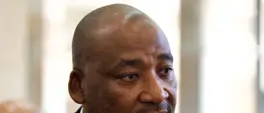
20 February 2026 14:45
JAMIL F. KHAN | Democratic institutions must be protected from rising religious fundamentalism
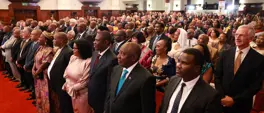
19 February 2026 05:15
CHARLES MATSEKE | From State of the Nation to Republic of Commissions: SA's playhouse of accountability
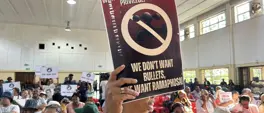
18 February 2026 17:30
VUYANI PAMBO | Biko, Bonga, and the running waters of Gauteng: Towards a liberation theology for South Africa's 2026 Elections



